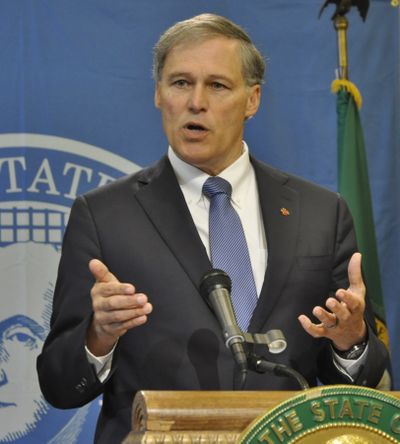Washington Legislature goes to double-overtime

OLYMPIA – The Legislature closed for about 17 hours overnight Tuesday – the amount of time between its ineffectual first special session and a second special session that some say could bring the state to a fiscal cliff.
Washington Gov. Jay Inslee criticized the largely Republican Senate majority Tuesday morning for pushing ideology over budget compromise as he issued the proclamation for a second legislative overtime period.
“The budget is our primary duty. That’s where our focus should be,” Inslee said. “They need to come to a common-sense position, so that we can fulfill the obligation to our kids.”
He also said he was directing his Cabinet to study what state government services would have to be shut down if the Legislature doesn’t pass a budget by July 1, the start of the state’s fiscal year. The state would have money because it would continue to collect taxes, but would have no statutory authority to spend it on some things.
Law enforcement and emergency services would likely be unaffected, but some services like state parks and license offices could close temporarily and some state workers could be furloughed.
Senate Majority Coalition Leader Rodney Tom, D-Medina, said Inslee was wrong in his contention that House Democrats have done all the compromising and the coalition has done none. But discussions will continue, and a budget agreement will be reached before July 1, he added.
“We will get the job done,” said Tom, one of two Democrats who joined all 23 Republicans in the Senate to form the coalition before the legislative session started. “This talk of a government shutdown is nonsense. It’s not going to happen.”
House Majority Leader Pat Sullivan, D-Covington, said he also hoped a budget would be negotiated and passed before the end of this month, but Inslee was right to study the implications of that not happening. Tom has been wrong in some previous predictions, Sullivan said.
“I believe at the start of the regular session, he said we’d be done in 105 days,” Sullivan said.
Tuesday was Day 30 of the first special session Inslee called after the Legislature failed to pass a two-year operating budget of more than $33 billion during its regular 105-day session.
The two chambers have spent most of that month away from the floor, passing relatively few bills as most members awaited word from their leaders on progress of budget negotiations.
All sides in the budget impasse argue that they have the right way to increase spending on public school education, which is a mandate from the state Supreme Court. Senate Republicans say their basic budget spends more on education than the House’s basic budget, about $1 billion compared with $700 million, without tax increases. House Democrats say they save more social programs and boost that $700 million by more than $200 million through the elimination of tax breaks in separate legislation, giving the Senate the chance to pay for extra programs for public schools and the state’s college system with that new money.
Along with its budget, the Senate Majority Coalition also passed three bills over the weekend that would make certain changes or reforms in state law. One would allow principals to reject teachers assigned to their schools, another would cap the growth in state spending on noneducation programs to a formula based on inflation and population, and a third would expand the 2-year-old system of allowing injured workers to accept structured settlements rather than regular payments from the state’s workers’ compensation system.
House Democrats can try to amend the language in the reform bills if they want, Tom said: “Everything’s a negotiation in Olympia. We’ve never said it’s our language or no language.”